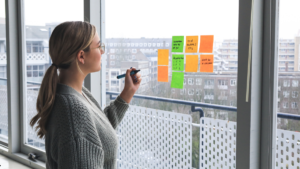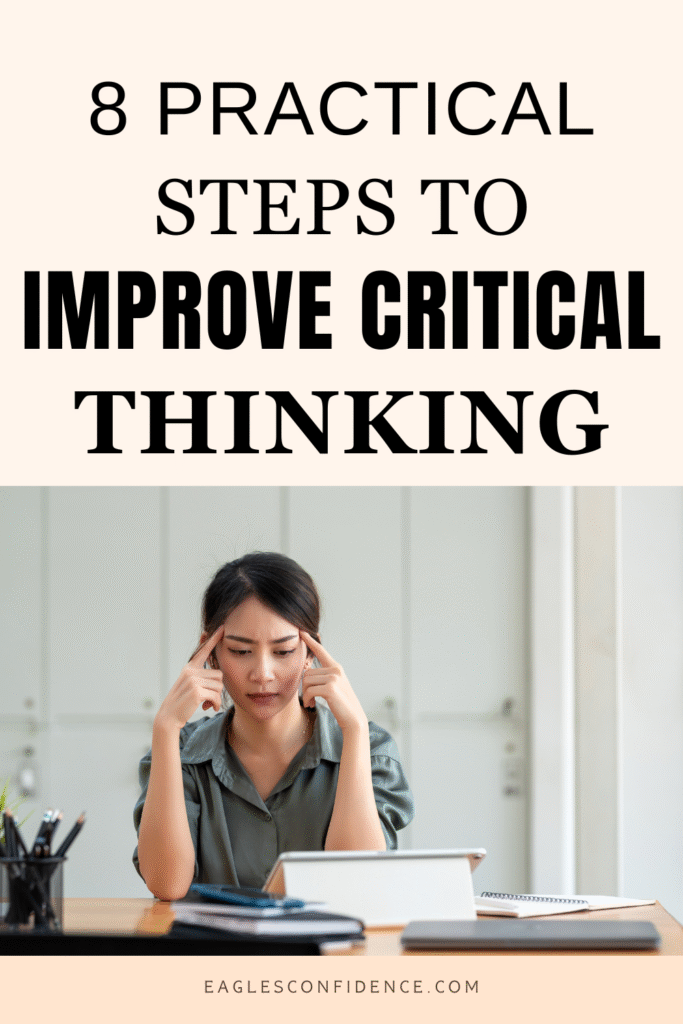Critical thinking is the objective analysis and evaluation of information to form a well-reasoned judgment. It’s the ability to think clearly, rationally, and independently, rather than accepting arguments or facts at face value. It involves being inquisitive, skeptical, reflective, and discriminating in what we accept as truth or knowledge.
With so much misinformation, polarization, and competing opinions in the modern world, strong critical thinking skills have never been more valuable or important. Critical thinking allows you to see the world with greater clarity and make better decisions in your personal and professional life. It leads to: Improved problem-solving skills, Ability to assess arguments and data, Consideration of different perspectives, Making informed, logical decisions, Better judgment and decision-making at work, Collaboration and communication with others, Fewer mistakes and bad choices
Strong critical thinking skills are important because they allow you to analyze and interpret information in an objective, rational way. This can lead to better decisions, more productive collaboration with others, and a deeper understanding of the world around you. Critical thinking also helps you consider multiple perspectives and to avoid jumping to conclusions based on incomplete or biased information.
How To Think Critically
Core Elements of Critical Thinking
Critical thinking is composed of several key components: analysis, evaluation, inference, explanation, and reasoning. Each is essential for understanding information on a deeper level and making better judgments.
1. Analysis
Analysis involves examining information by breaking it down into its component parts. It helps you understand complex concepts, arguments, or data.
For example, when analyzing a text, a critical thinker looks at the author’s argument and assumptions, the structure of the text, the language used, and the evidence presented.
Good analysis involves: Asking questions, Spotting patterns and assumptions, Identifying strengths and weaknesses. A critical thinker takes information apart to understand how it works and what it means.
2. Evaluation
Evaluation means judging the credibility, relevance, and accuracy of information. When you evaluate something, you determine if it’s trustworthy and useful.
In evaluating a source of information, for example, a critical thinker might consider its authority, accuracy, currency, objectivity, and coverage.
A good evaluator practices healthy skepticism and questions everything. This includes checking facts, looking for context, and weighing the quality of evidence before reaching a conclusion.

3. Inference
Inference is the ability to draw logical conclusions based on the available evidence. It means reading between the lines and using reasoning to fill in gaps.
Critical inferences require:
Recognizing patterns in data or behavior
Making educated guesses or predictions based on evidence
Thinking of alternative explanations before drawing conclusions
Acknowledging the limitations of the information you have
A good inference is grounded in logic and open to being revised in light of new information.
Related: How To Meditate Properly For Best Results
4. Explanation
Explanation is communicating how you arrived at a certain conclusion. A critical thinker can clearly and logically explain their thought process to others.
This skill is especially important for group discussions, presentations, and collaborative problem-solving where clarity and transparency matter.
5. Reasoning
Reasoning is the process of using logic and evidence to connect ideas, form conclusions, and build arguments. There are two primary forms of reasoning that are used in critical thinking: inductive and deductive reasoning.
Inductive reasoning involves drawing general conclusions from specific observations.
Deductive reasoning uses general principles to reach specific conclusions.
Strong reasoning skills are at the heart of critical thinking. They are used to weigh evidence and make more logical arguments and judgments.
Practical Steps to Improve Critical Thinking
It takes active and consistent practice to improve critical thinking. The most important strategies for critical thinkers include:
1. Ask Questions
Good critical thinkers are curious and ask lots of questions. By questioning information, you are able to dig deeper, see issues more clearly, and avoid making assumptions.
Ask both open-ended and closed questions (yes/no).
Good questions lead to reflection and a better understanding of a subject or problem.

2. Be Aware of Biases
Our brains use mental shortcuts called cognitive biases to process information. These biases unconsciously influence how we interpret information and lead us to make logical errors.
Some common cognitive biases include confirmation bias, availability heuristic, anchoring bias, halo effect, and more.
A good critical thinker is aware of these biases and actively works to avoid them by: Seeking multiple perspectives, Using objective decision-making tools like pros/cons lists, Engaging in mindfulness and self-awareness practices and Asking yourself if a piece of information is really true.
3. Evaluate Sources
Check the sources of information by using four major criteria: authority, accuracy, objectivity, and relevance.
Good critical thinkers know how to find high-quality sources and to quickly spot poor or biased sources.
Questions to ask:
Who wrote/published this?
Is this supported by evidence?
Is this source impartial and objective?
Does this information apply to the topic at hand?
Cross-check facts and be sure to read citations and bibliographies for supporting evidence.
4. Practice Active Listening
Active listening means listening attentively with the intent to fully understand and engage with what’s being said. It’s the opposite of passive listening where you just hear words but don’t give them much thought.
Active listening involves:
Summarizing key points
Asking questions for clarification
Reflecting on the speaker’s emotions and meaning
Avoiding interruptions and listening without judgment
Active listening is a powerful skill for sharpening your understanding and ability to think critically about what you hear.
5. Practice Logic and Reasoning
The key to sharpening your reasoning skills is to practice logic puzzles and brainteasers, solve problems, engage in debates, and analyze arguments.
Over time, this makes it easier to think more clearly and avoid jumping to faulty conclusions.

6. Stay Curious
Curiosity is the drive to learn and explore the world around you. It’s the desire to ask questions, seek new experiences, and discover more about a topic or subject.
Curious people are natural critical thinkers because they want to know more.
Simple things you can do to stay curious:
Try new activities
Read a variety of books and articles
Interact with different people and viewpoints
Explore new topics and learn new skills
A curious mind is naturally open, inquisitive, and never satisfied with easy answers.
Related: 8 Best Ways To Be Selfless
7. Reflect on Your Thinking
Reflection is the process of looking inward to evaluate your own thoughts, judgments, and reasoning. It allows you to identify patterns and inconsistencies in your thinking.
Methods for self-reflection that work well include:
Journaling to write down your thoughts and discover insights
Group discussions to listen to multiple perspectives
Getting feedback to help you see things more objectively
Reflection improves your ability to understand yourself, your problems, and the world around you.
8. Engage in Problem-Solving Activities
Activities that challenge your mind are a great way to practice and improve your critical thinking skills. Some examples include puzzles, case studies, debates, simulations, and escape rooms.
Problem-solving activities that work well:
Help you build analytical and creative thinking
Are useful for collaboration and teamwork
Stimulate your strategic thinking
Stretch your ability to evaluate information and ideas
Build your resilience and ability to handle complexity
Examples include chess, logic games, math problems, mystery novels/crime scene investigations, and escape rooms.
Mindset Shifts That Support Critical Thinking
Strong critical thinkers share certain mindsets and mental models:
1. Openness
Strong critical thinkers are open to new ideas and ways of thinking. This helps you consider the full range of evidence and different points of view.
2. Curiosity
Curiosity drives the critical thinking process, as a desire to learn leads you to question and explore more deeply.

3. Challenge Your Beliefs
Good critical thinkers are willing to consider that their own beliefs, points of view, and ideas may be wrong or incomplete. This is necessary for intellectual growth and change.
Conclusion
Critical thinking is the process of actively and objectively analyzing information to form a well-reasoned judgment. It means thinking in an open, inquisitive, and reflective way, rather than accepting facts or opinions at face value.
Critical thinking is important because it allows you to see the world with greater clarity and to make better decisions in your personal and professional life. The most important critical thinking skills are analysis, evaluation, inference, explanation, and reasoning.
To practice critical thinking, ask questions, be aware of biases, evaluate sources, practice active listening, and engage in problem-solving activities. Adopt the important critical thinking mindsets of openness, curiosity, and a willingness to challenge your own beliefs.
Save the pin for later

- 10 Signs of a Cheating Partner You Should Never Ignore - January 11, 2026
- 10 Effective Ways to Practice Gratitude - November 20, 2025
- 12 Everyday Habits That Can Diminish Your Memory Power - November 15, 2025




